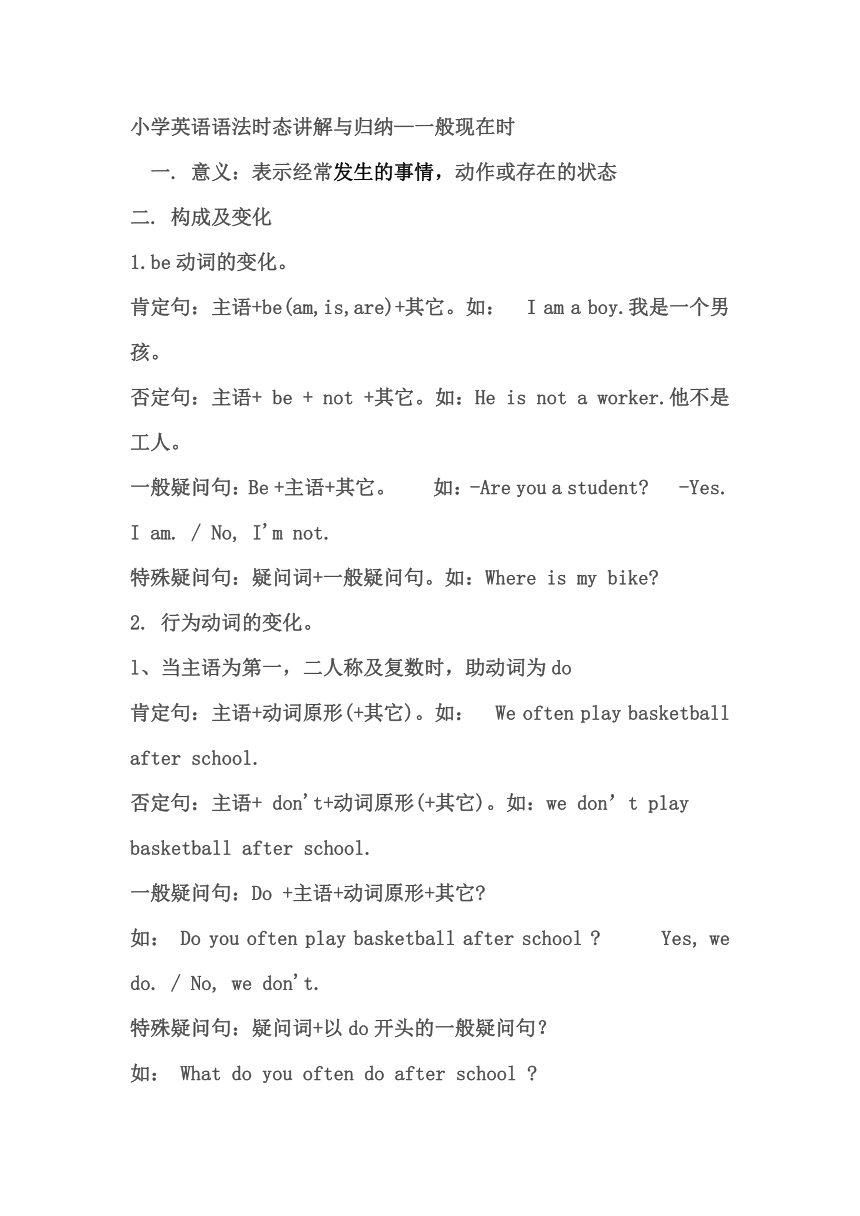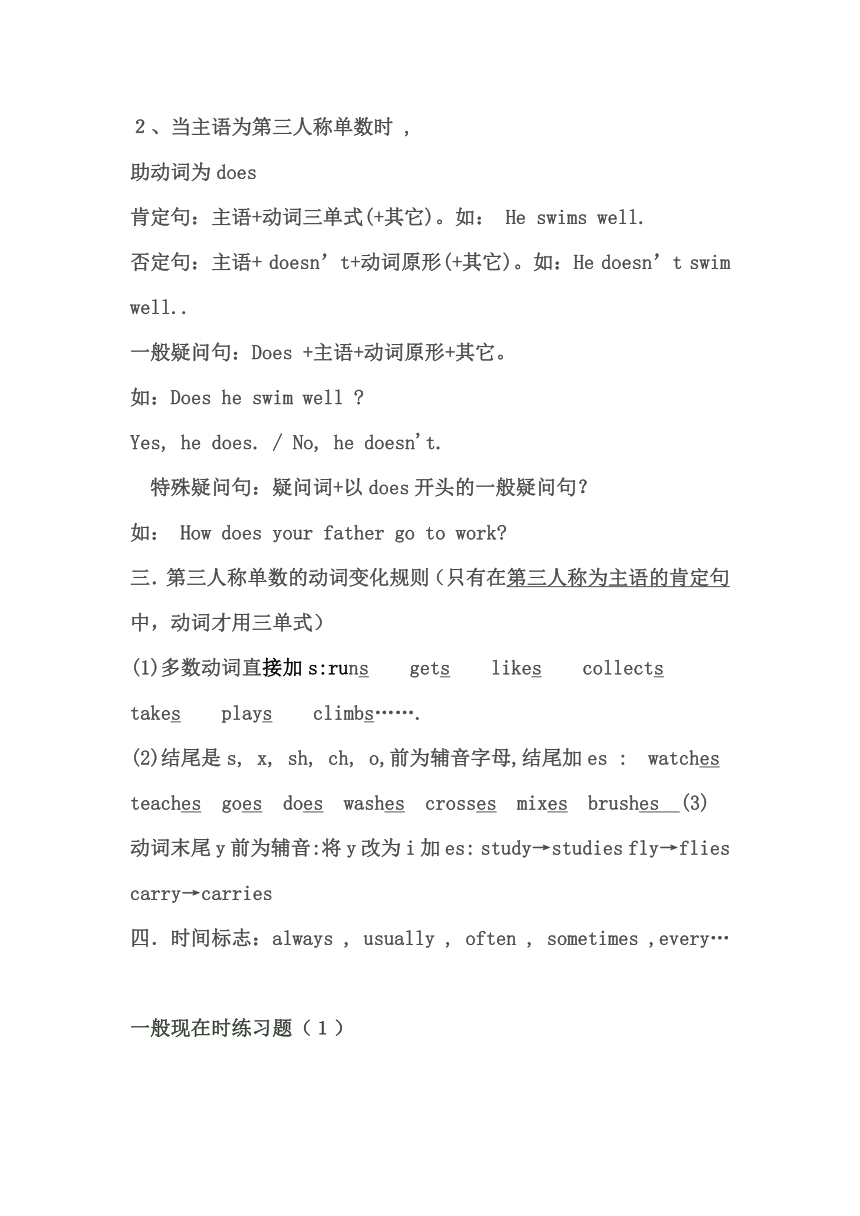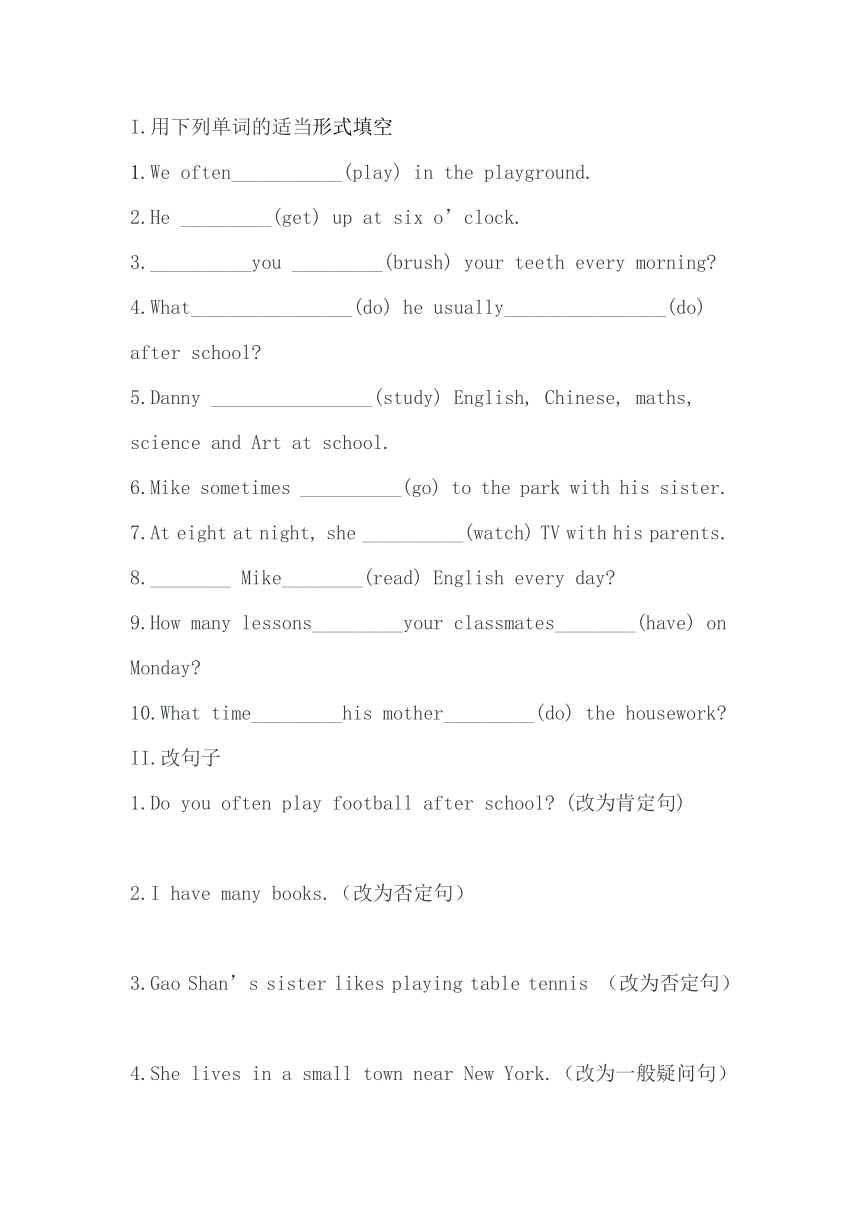外研版(三年级起点)小学英语语法时态讲解与归纳
文档属性
| 名称 | 外研版(三年级起点)小学英语语法时态讲解与归纳 |  | |
| 格式 | zip | ||
| 文件大小 | 34.5KB | ||
| 资源类型 | 教案 | ||
| 版本资源 | 外研版(三年级起点) | ||
| 科目 | 英语 | ||
| 更新时间 | 2017-07-19 17:10:00 | ||
图片预览



文档简介
小学英语语法时态讲解与归纳—一般现在时
一.
意义:表示经常发生的事情,动作或存在的状态
二.
构成及变化
1.be动词的变化。
肯定句:主语+be(am,is,are)+其它。如: I
am
a
boy.我是一个男孩。
否定句:主语+
be
+
not
+其它。如:He
is
not
a
worker.他不是工人。
一般疑问句:Be
+主语+其它。 如:-Are
you
a
student
-Yes.
I
am.
/
No,
I'm
not.
特殊疑问句:疑问词+一般疑问句。如:Where
is
my
bike
2.
行为动词的变化。
l、当主语为第一,二人称及复数时,助动词为do
肯定句:主语+动词原形(+其它)。如: We
often
play
basketball
after
school.
否定句:主语+
don't+动词原形(+其它)。如:we
don’t
play
basketball
after
school.
一般疑问句:Do
+主语+动词原形+其它
如:
Do
you
often
play
basketball
after
school
Yes,
we
do.
/
No,
we
don't.
特殊疑问句:疑问词+以do开头的一般疑问句?
如:
What
do
you
often
do
after
school
2、当主语为第三人称单数时
,
助动词为does
肯定句:主语+动词三单式(+其它)。如:
He
swims
well.
否定句:主语+
doesn’t+动词原形(+其它)。如:He
doesn’t
swim
well..
一般疑问句:Does
+主语+动词原形+其它。
如:Does
he
swim
well
Yes,
he
does.
/
No,
he
doesn't.
特殊疑问句:疑问词+以does开头的一般疑问句?
如:
How
does
your
father
go
to
work
三.第三人称单数的动词变化规则(只有在第三人称为主语的肯定句中,动词才用三单式)
(1)多数动词直接加s:runs gets likes collects takes plays climbs…….
(2)结尾是s,
x,
sh,
ch,
o,前为辅音字母,结尾加es
: watches teaches goes does washes crosses mixes brushes
(3)动词末尾y前为辅音:将y改为i加es:
study→studies
fly→flies
carry→carries
四.时间标志:always
,
usually
,
often
,
sometimes
,every…
一般现在时练习题(1)
I.用下列单词的适当形式填空
1.We
often___________(play)
in
the
playground.
2.He
_________(get)
up
at
six
o’clock.
3.__________you
_________(brush)
your
teeth
every
morning
4.What________________(do)
he
usually________________(do)
after
school
5.Danny
________________(study)
English,
Chinese,
maths,
science
and
Art
at
school.
6.Mike
sometimes
__________(go)
to
the
park
with
his
sister.
7.At
eight
at
night,
she
__________(watch)
TV
with
his
parents.
8.________
Mike________(read)
English
every
day
9.How
many
lessons_________your
classmates________(have)
on
Monday
10.What
time_________his
mother_________(do)
the
housework
II.改句子
1.Do
you
often
play
football
after
school
(改为肯定句)
2.I
have
many
books.(改为否定句)
3.Gao
Shan’s
sister
likes
playing
table
tennis
(改为否定句)
4.She
lives
in
a
small
town
near
New
York.(改为一般疑问句)
5.I
watch
TV
every
day.(改为一般疑问句)
6.We
have
four
lessons.(改为否定句)
7.Nancy
doesn’t
run
fast
(改为肯定句)
8.My
dog
runs
fast.
否定句
9.Mike
has
two
letters
for
him.
一般疑问
10.I
usually
play
football
on
Friday
afternoon.
划线提问
11.Su
Yang
usually
washes
some
clothes
on
Saturday.
划线提问:
12.Mingming
usually
waters
the
flowers
every
day.
划线部分提问:
13.Tom
does
his
homework
at
home.
划线部分提问
一般现在时练习题(2)
一、用所给动词的真确形式填空
1.I like
____________
(swim).
2.He
_________(read)
English every day.
3.We
_________(go)to
school
at
seven
in
the
morning.
4.Mike________(go)to
school
at
seven
in
the
morning.
5.My mother________(like)
______(go)
shopping.
6.I
can
________(draw) many beautiful pictures.
7.She_________(make)
a model plane.
8.Do you
________(like)_________(run)
9.Does he_________(like)_________(jump)
10.Does
Nancy_________(grow)flowers
on
Saturday
11.The teachers________(like)___________(dance).
12.The
teacher________(like)____________(dance).
13.The
students___________(speak)
English
in
class.
14.The
student_________(speak)
Chinese
after
class.
15.
Let’s____________and
play
football
.
(
go
)
16.
He_____________
like
swimming
.
(
not
)
17.
I’m
sorry
____________that
.
(
hear
)
18.
Wang
Bing
is____________
(
write
)
an
E-mail
to
his
friend
.
19.
He
has_____________a
headache
.
(
get
)
20.
_________you
study
English
at
school
Yes
,
I___________.
(
do
)
21.
__________your
sister
study
English
at
school
No
,
she__________
.
(
do
)
22.
I’m
_________
better
.
(
feel
)
23.
Why__________Tom
absent
today
(
be
)
二、用所给的人称改写句子
1.I
take
photos
on
Sunday.
(
Mike)
2.We
grow
beautiful
flowers.
(she)
3.They
like
collecting
stamps.
(Ben)
4.I
listen
to
music
carefully.
(my
aunt)
5.You
like
making
a
model
ship.
(Helen)
6.We
clean
the
classroom
every
day.
(he)
7.They
look
after
the
pandas.
(Mr
Wang)
8.I
draw
a
tree
and
some
flowers.
(Nancy)
9.We
go
to
bed
at
eight.
(
my
sister)
10.I
read
newspapers
in
the
evening.
(Mr
Green)
一.
意义:表示经常发生的事情,动作或存在的状态
二.
构成及变化
1.be动词的变化。
肯定句:主语+be(am,is,are)+其它。如: I
am
a
boy.我是一个男孩。
否定句:主语+
be
+
not
+其它。如:He
is
not
a
worker.他不是工人。
一般疑问句:Be
+主语+其它。 如:-Are
you
a
student
-Yes.
I
am.
/
No,
I'm
not.
特殊疑问句:疑问词+一般疑问句。如:Where
is
my
bike
2.
行为动词的变化。
l、当主语为第一,二人称及复数时,助动词为do
肯定句:主语+动词原形(+其它)。如: We
often
play
basketball
after
school.
否定句:主语+
don't+动词原形(+其它)。如:we
don’t
play
basketball
after
school.
一般疑问句:Do
+主语+动词原形+其它
如:
Do
you
often
play
basketball
after
school
Yes,
we
do.
/
No,
we
don't.
特殊疑问句:疑问词+以do开头的一般疑问句?
如:
What
do
you
often
do
after
school
2、当主语为第三人称单数时
,
助动词为does
肯定句:主语+动词三单式(+其它)。如:
He
swims
well.
否定句:主语+
doesn’t+动词原形(+其它)。如:He
doesn’t
swim
well..
一般疑问句:Does
+主语+动词原形+其它。
如:Does
he
swim
well
Yes,
he
does.
/
No,
he
doesn't.
特殊疑问句:疑问词+以does开头的一般疑问句?
如:
How
does
your
father
go
to
work
三.第三人称单数的动词变化规则(只有在第三人称为主语的肯定句中,动词才用三单式)
(1)多数动词直接加s:runs gets likes collects takes plays climbs…….
(2)结尾是s,
x,
sh,
ch,
o,前为辅音字母,结尾加es
: watches teaches goes does washes crosses mixes brushes
(3)动词末尾y前为辅音:将y改为i加es:
study→studies
fly→flies
carry→carries
四.时间标志:always
,
usually
,
often
,
sometimes
,every…
一般现在时练习题(1)
I.用下列单词的适当形式填空
1.We
often___________(play)
in
the
playground.
2.He
_________(get)
up
at
six
o’clock.
3.__________you
_________(brush)
your
teeth
every
morning
4.What________________(do)
he
usually________________(do)
after
school
5.Danny
________________(study)
English,
Chinese,
maths,
science
and
Art
at
school.
6.Mike
sometimes
__________(go)
to
the
park
with
his
sister.
7.At
eight
at
night,
she
__________(watch)
TV
with
his
parents.
8.________
Mike________(read)
English
every
day
9.How
many
lessons_________your
classmates________(have)
on
Monday
10.What
time_________his
mother_________(do)
the
housework
II.改句子
1.Do
you
often
play
football
after
school
(改为肯定句)
2.I
have
many
books.(改为否定句)
3.Gao
Shan’s
sister
likes
playing
table
tennis
(改为否定句)
4.She
lives
in
a
small
town
near
New
York.(改为一般疑问句)
5.I
watch
TV
every
day.(改为一般疑问句)
6.We
have
four
lessons.(改为否定句)
7.Nancy
doesn’t
run
fast
(改为肯定句)
8.My
dog
runs
fast.
否定句
9.Mike
has
two
letters
for
him.
一般疑问
10.I
usually
play
football
on
Friday
afternoon.
划线提问
11.Su
Yang
usually
washes
some
clothes
on
Saturday.
划线提问:
12.Mingming
usually
waters
the
flowers
every
day.
划线部分提问:
13.Tom
does
his
homework
at
home.
划线部分提问
一般现在时练习题(2)
一、用所给动词的真确形式填空
1.I like
____________
(swim).
2.He
_________(read)
English every day.
3.We
_________(go)to
school
at
seven
in
the
morning.
4.Mike________(go)to
school
at
seven
in
the
morning.
5.My mother________(like)
______(go)
shopping.
6.I
can
________(draw) many beautiful pictures.
7.She_________(make)
a model plane.
8.Do you
________(like)_________(run)
9.Does he_________(like)_________(jump)
10.Does
Nancy_________(grow)flowers
on
Saturday
11.The teachers________(like)___________(dance).
12.The
teacher________(like)____________(dance).
13.The
students___________(speak)
English
in
class.
14.The
student_________(speak)
Chinese
after
class.
15.
Let’s____________and
play
football
.
(
go
)
16.
He_____________
like
swimming
.
(
not
)
17.
I’m
sorry
____________that
.
(
hear
)
18.
Wang
Bing
is____________
(
write
)
an
to
his
friend
.
19.
He
has_____________a
headache
.
(
get
)
20.
_________you
study
English
at
school
Yes
,
I___________.
(
do
)
21.
__________your
sister
study
English
at
school
No
,
she__________
.
(
do
)
22.
I’m
_________
better
.
(
feel
)
23.
Why__________Tom
absent
today
(
be
)
二、用所给的人称改写句子
1.I
take
photos
on
Sunday.
(
Mike)
2.We
grow
beautiful
flowers.
(she)
3.They
like
collecting
stamps.
(Ben)
4.I
listen
to
music
carefully.
(my
aunt)
5.You
like
making
a
model
ship.
(Helen)
6.We
clean
the
classroom
every
day.
(he)
7.They
look
after
the
pandas.
(Mr
Wang)
8.I
draw
a
tree
and
some
flowers.
(Nancy)
9.We
go
to
bed
at
eight.
(
my
sister)
10.I
read
newspapers
in
the
evening.
(Mr
Green)
